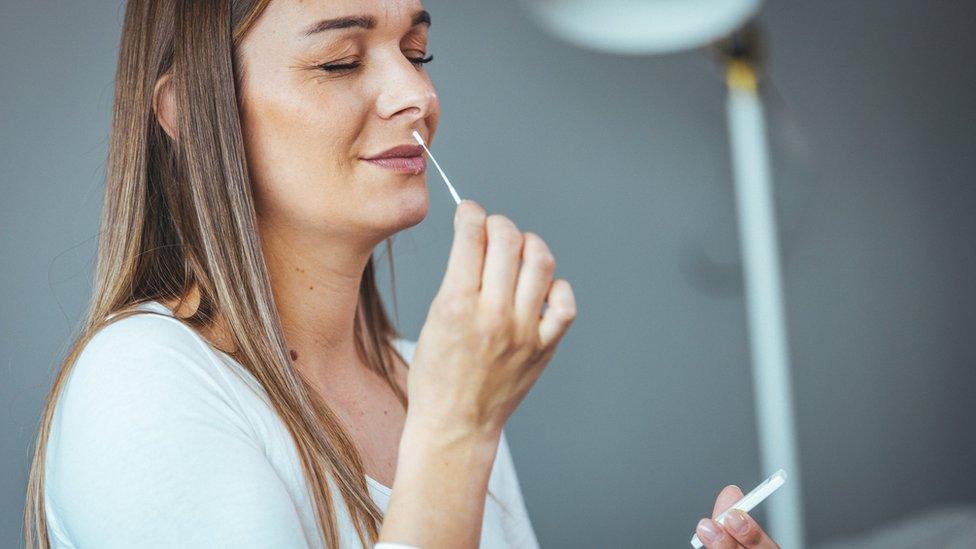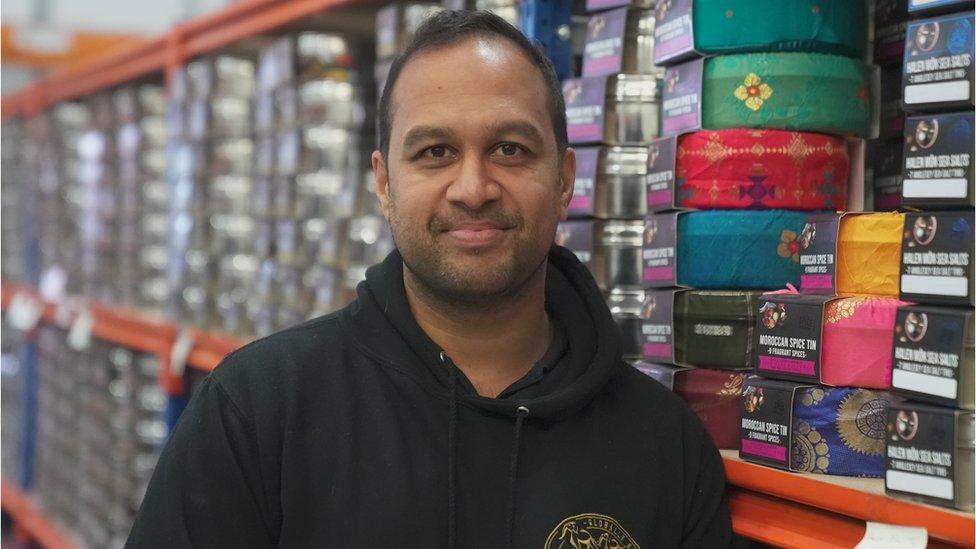Calls grow for free or low-cost Covid tests to keep staff safe
- Published
- comments

After years of disruption, many firms are hoping for things to return to normal. But it's not yet business as usual.
The recent spike in Covid cases has caused havoc, with staff sickness impacting entire supply chains.
The British Chambers of Commerce (BCC) is now calling for all companies to be given free or cheap lateral flow tests.
The government said it recognised the impact of rising costs and had given firms £400 billion in Covid support.
But Jane Gratton of the BCC said Covid, paired with rising costs, meant this was a "precarious time" for business.
The organisation, which represents tens of thousands of businesses, added that three quarters of its members had at least one person off sick in the last four weeks.
It says that free or lower cost testing is necessary to ensure that both staff and customers are kept safe.
All of the above is on the mind of Sanjay Aggarwal, who runs Spice Kitchen on the outskirts of Liverpool.
The company, which blends and packages ingredients for gifts and subscription deliveries, has 15 staff split between the office, and others blending and bagging spices on the shop floor.

Sanjay Aggarwal runs Spice Kitchen on the outskirts of Liverpool
"We've had instances where we've had a number of cases in the warehouse, enough for us to shut down production for a week or two weeks," Sanjay says. "There were times when it was just me in the unit running the whole business."
Official data shows that the Omicron peak for factory-floor workers was back in January, but for office-based staff it has come in more recent weeks. The same pattern has emerged at Spice Kitchen.
The firm has grown during the pandemic as so many of us were stuck at home. But now restrictions are more relaxed, Sanjay feels like it's been down to him and his small team to work out what to do.
"The guidance is not totally clear and it's tricky for businesses, having to make up their own rules," he explains. "It now comes down to leadership teams like myself to come up with the right requirements for staff."
The company has moved to a larger space, which has helped, but they've also recruited and found they've needed to get to know new starters a bit better.
"It was important for us to find out about people's personal situations," explains Sanjay, adding that this was a priority when discussing vaccines with young warehouse staff.
"It's not down to us as employers to enforce that, but we do need to know who is and who isn't so we can make the right decisions to protect them. Especially as some of our young staff are caring for family members," he added.
Kieran Sefton, who's been with the business since he left school, said he recently had Covid but was able to do some work from home.
"I've had Covid and I just wasn't very well, but I could still work at home and get on with things. For me, it was more of a worry about my family."
Figures from the Office for National Statistics (ONS) show that about one in six businesses (17%) are paying sick pay to staff voluntarily self-isolating when testing positive.
And as the cost of living rises, many can't afford to skip a paycheque or pay for a lateral flow test. A pack of five will set you back just under £10 from most High Street chemists.
Spice Kitchen Operations Manager Lesley McKay says the business has offered free tests and sanitised spaces, but there is a limit to what they can do and they know they need to keep working.
"We are actually really busy at the moment. We don't take it lightly, but as a small business, you do just have to crack on," she says.

Lesley McKay says it's important the small business keeps going
Spice Kitchen is not alone in this experience.
The Federation of Small Businesses has said one in seven businesses they represent could not trade as they should at the moment. The challenge is more acute for customer-facing staff in shops, bars or restaurants.
Laura Kearsley specialises in employment law at Nelsons Solicitors and is advising her clients how to navigate what they describe as a "lack of guidelines".
"Most businesses were glad to see the back of formal regulations but in a way they were a comfort blanket with someone making the decision for you," she explains. "Now businesses have more discretion, but that brings a headache in itself for them."
Laura says she's hearing three main issues from her clients; what policies to implement for staff with Covid now free tests are not available, what to do with staff they think are not being honest about Covid symptoms because they are worried about not being paid and how to support vulnerable members of the workforce.
"In all cases, it's important firms properly listen to their staff," she says.
The wave of infections may be passing its peak, but working out just how business lives with Covid, could take many more months to work out fully.
A government spokesperson said: "Employers still have a duty of care to their staff, so they should take steps to prevent infection in the workplace, meaning if someone is displaying Covid-19 symptoms or has tested positive, they should be considered sick and stay at home to avoid contact with others."
They added: "We recognise the impact rising costs will have on businesses of all sizes and we have backed businesses throughout the pandemic with an unprecedented package of support including VAT cuts, business rates holidays and government backed loans worth around £400 billion."
- Published10 April 2022

- Published24 March 2022
